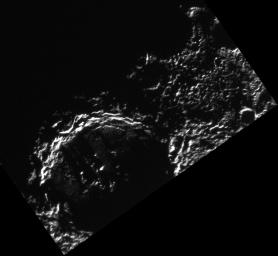
|
To Strive, To Seek, To Find, and Not To Yield
- Click the image above for a larger view
- Full-Res JPEG (1102 x 1015) (84.0 kB)
- Full-Res TIFF (1102 x 1015) (1.1 MB)
Caption:
On this day 100 years ago (January 17, 1912), Robert F. Scott and his party became the second group of humans to reach a latitude of 90° South on the Earth, having lost the race to the pole to Amundsen . Tragically, Captain Scott and his four companions died on the return journey.
On Mercury, the point of 90° South is located at about the 12 o'clock position on the lower inner wall of the large crater in the image above (crater Chao Meng-Fu ).
Ernest Shackleton, another heroic explorer of Antarctica, wrote this in his diary in 1908: "It falls to the lot of few men to view land not previously seen by human eyes, and it was with feelings of keen curiosity, not unmingled with awe, that we watched the new mountains rise from the great unknown that lay ahead of us." Spacecraft such as MESSENGER continue the spirit of exploration exemplified by Amundsen, Scott, and Shackleton. It is with the same feelings of curiosity and awe that we view the new land revealed to us by robotic explorers sent forth into the great unknown.
This image was acquired as part of MDIS's campaign to monitor the south polar region of Mercury. By imaging the polar region every four MESSENGER orbits as illumination conditions change, features that were in shadow on earlier orbits can be discerned and any permanently shadowed areas can be identified after repeated imaging over one solar day. During MESSENGER's one-year mission, MDIS's WAC is used to monitor the south polar region for the first Mercury solar day (176 Earth days), and MDIS's NAC is used for imaging the south polar region during the second Mercury solar day.
Date acquired:
December 14, 2011
Image Mission Elapsed Time (MET):
232384499
Image ID:
1136469
Instrument:
Narrow Angle Camera (NAC) of the Mercury Dual Imaging System (MDIS)
Center Latitude:
-88.47°
Center Longitude:
34.84° E
Resolution:
299 meters/pixel
Scale:
Chao Meng-Fu has a diameter of 129 km (80 miles)
Background Info:
The MESSENGER spacecraft is the first ever to orbit the planet Mercury, and the spacecraft's seven scientific instruments and radio science investigation are unraveling the history and evolution of the Solar System's innermost planet. Visit the Why Mercury? section of this website to learn more about the key science questions that the MESSENGER mission is addressing. During the one-year primary mission, MDIS is scheduled to acquire more than 75,000 images in support of MESSENGER's science goals.
These images are from MESSENGER, a NASA Discovery mission to conduct the first orbital study of the innermost planet, Mercury. For information regarding the use of images, see the MESSENGER image use policy .
Cataloging Keywords:
| Name | Value | Additional Values |
|---|---|---|
| Target | Mercury | |
| System | ||
| Target Type | Planet | |
| Mission | MESSENGER | |
| Instrument Host | MESSENGER | |
| Host Type | Orbiter | |
| Instrument | Mercury Dual Imaging System (MDIS) | |
| Detector | Narrow Angle Camera (NAC) | |
| Extra Keywords | Crater, Grayscale, Mountain, Radio, Shadow | |
| Acquisition Date | ||
| Release Date | 2012-01-17 | |
| Date in Caption | 2011-12-14 | |
| Image Credit | NASA/Johns Hopkins University Applied Physics Laboratory/Carnegie Institution of Washington | |
| Source | photojournal.jpl.nasa.gov/catalog/PIA15330 | |
| Identifier | PIA15330 | |
